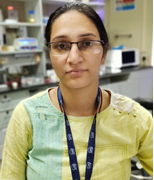
Ritu Dixit
Banaras Hindu University, India IndiaTitle: Genetic Disorders
Abstract:
Mutations of GATA4, a cardiogenic transcription factor, cause cardiac septal defects and cardiomyopathy in humans. Many of these interacting partners are well recognized, These variants involving highly conserved residues of protein may affect protein-protein or protein-DNA interactions, leading to gene regulatory network dysregulation and thereby causing human disease. Many of the interacting partners and downstream effectors have already been identified, however their cardiac specific downstream genes are still a mystery. Here we aimed to analyze the genome wide molecular effects of a novel GATA4 transactivation domain (TAD) variant (p.Ala8Asp). The genome-wide expression profile of the affected genes were compared between wildtype and mutant protein using RNA sequencing. Western blotting, dual luciferase promoter assay, EMSA and immunofluorescence was done to depict the effect of mutation on expression, transcriptional activity, DNA binding affinity and cellular localisation of GATA4 respectively. Total RNA-sequencing of transiently transfected P19 cells expressing wild-type and mutant proteins was performed. The novel variant, p.Ala8Asp was observed to be significantly associated with CHD in our patient cohort and in vitro studies revealed severe functional deficits. Transiently transfected P19 cells with p.Ala8Asp construct exhibited over-expression concomitantly enhancing the activation of cardiac specific Nppa and Actc1 promoters. Mutant protein depicted reduced DNA binding affinity in EMSA. Total transcriptome analysis of p.A8D vs WT showed 430 differentially expressed genes (DEGs), 280 of them were downregulated and 150 were upregulated. These genes were enriched in different biological processes including cardiac development (n=43 genes). Twelve of these genes were identified as direct targets of GATA4. SRF responsive genes (n=29) and MEF2C target genes (n=16) were also observed to be differentially regulated in response to GATA4 mutant reflecting the obligatory role of GATA4 in regulating the expression of these genes.
Biography:
Ritu Dixit did her Ph.D in cardiovascular genetics from Department of Zoology, Banaras Hindu University, India. She holds a M.Sc in Biotechnology with outstanding performance including merit scholarship (2008-2010) and Junior Research Fellowship (2011-2014) from Department of Biotechnology, Ministry of Science and Technology, Government of India. She has been awarded travel grants (2016) from Indian Council of Medical Research (ICMR) and Department of Science and Technology (DST), New Delhi, India for attending international conferences. She was also awarded with Senior Research Fellowship from ICMR in 2014. She has 8 research articles in peer reviewed journals and 2 book chapters to her credit. She is currently working as a postdoctoral fellow at Brien Holden Eye Research Centre, LVPEI, Hyderabad, India. Her primary research interest is deciphering the molecular genetic basis of human diseases using cutting edge technologies.
